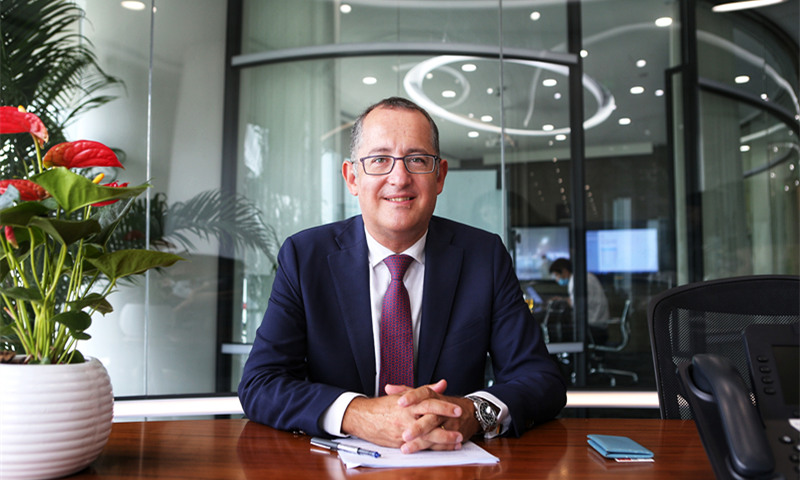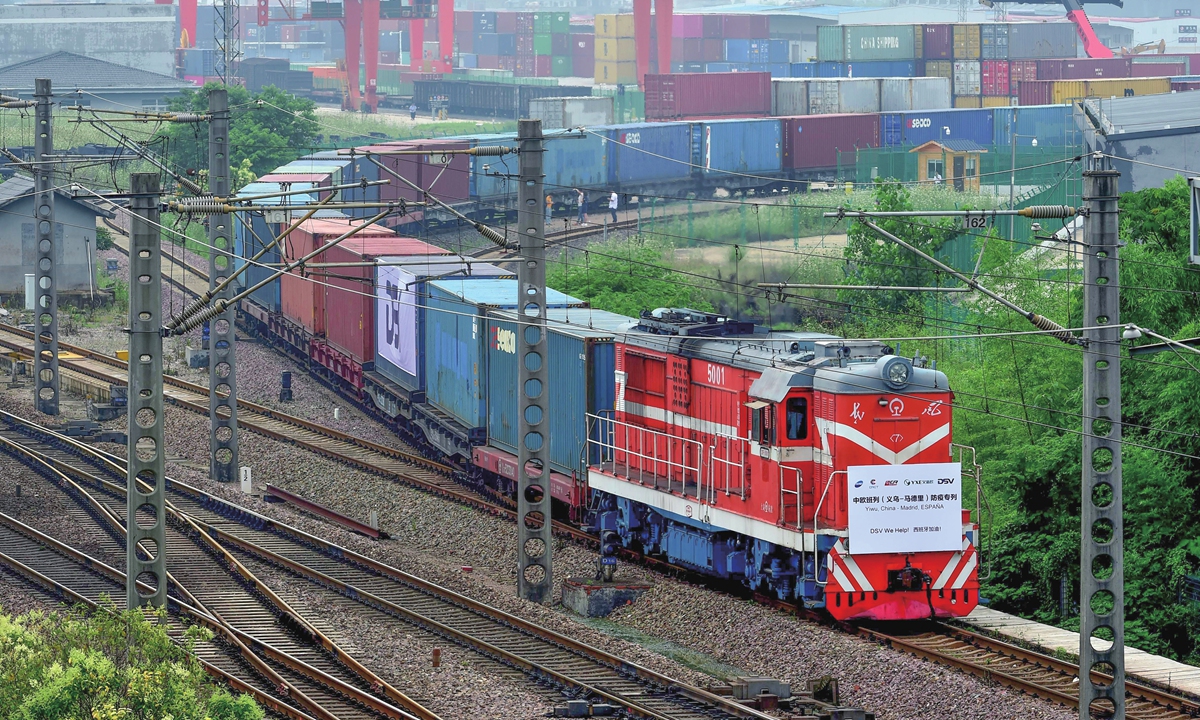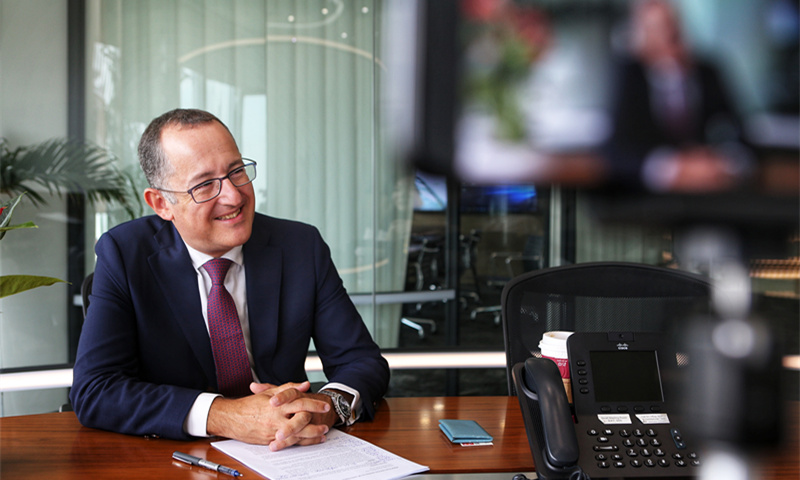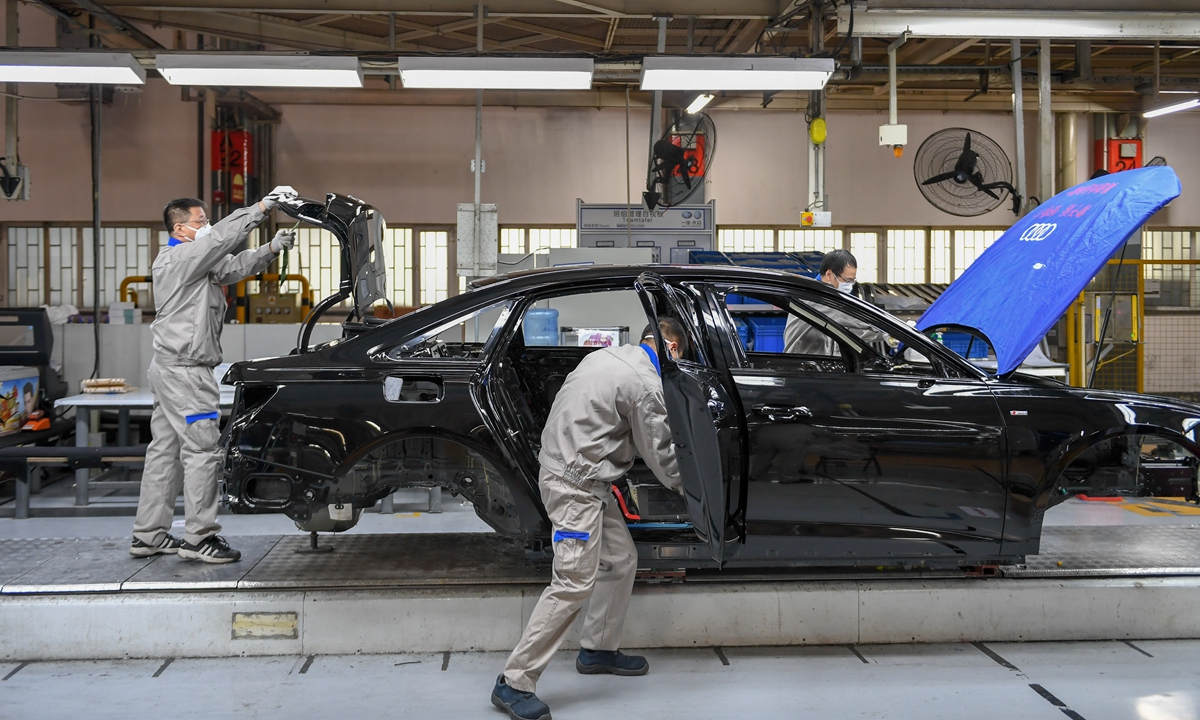Opportunity of mutual benefit for China-Europe cooperation amid US aggressive policy: Denis Depoux
Editor's note:

Denis Depoux , Global Managing Director of Roland Berger Photo: Cui Meng/ GT
Part I Opportunity to work together
GT: Chinese State Councilor and Foreign Minister Wang Yi is visiting five countries in Europe. Could this be seen as a sign of further cooperation between China and Europe?
Depoux: Wang's visit looks like a sign that, and maybe this is understood, there is a bit more momentum in accelerating the ongoing negotiations on a comprehensive agreement on investment and trying to take advantage of the imbalance between China and the US.
China and Europe have to fight together against decoupling initiated by the US. Decoupling is evil and would be extremely detrimental to the global economy and growth. But in order to fight against decoupling, China needs also to take some steps forward in order to conclude agreements with Europe. I assume that this is one of the objectives of Wang's visit.
In the last few months, in the context where the US policy toward China has been very aggressive, a lot of uncertainty has been created for international businesses, especially for European businesses.
The comprehensive agreement on investment has been under negotiation for quite some time and still has to be concluded. But there is a hope that it can be concluded this year. The expectations of Europe toward China are very clear: market access, reciprocity, fair competition in China as well as in the world, in particular with state-owned enterprises.
It's also more commitment toward the fight against climate change, where both Europe and China are at the forefront. It has to go further beyond the Paris agreement, as unfortunately global warming is here. The COVID-19 crisis in a way is a reminder that if we don't pay enough attention to these global issues around the sustainability, it can create immense damage.
GT: Apart from climate change, in what sectors can China and Europe work together?
Depoux: The world needs an institution-based, rules-based global economic order. As we have seen the US policy, and most likely in the next few years, the US will not help reform the WTO - the overarching organization. This falls in the hands of the other leaders of this world - China and Europe.
We need leadership, and that's an area where Europe and China can work together. And under aggressive American policy toward China, there's opportunity to achieve something mutually beneficial to Europe and China. And I strongly believe that there is also a window for China to welcome a new wave of international investment and particularly European investment.
Why is that? Chinese economy is shifting from relatively low to medium-added-value industry to high-added-value industry. It's moving from an export-driven model to a more domestic demand-driven economy. It's shifting also from a model dominated by resources, industry and manufacturing to a model which is more balanced with consumption and services, as services now weighs 60 to 63 percent of the Chinese GDP.
In order to be successful for any business in such an environment, you need to be here. It means that there is a renewed incentive to invest in China. And part of it will take for foreign companies to actually invests more in China, for instance, chemical company BASF and Exxon Mobil.
GT: While China and Europe are expecting closer economic ties, tensions between China and the US are on the rise. Under such context, can Europe take over US market share in China?
Depoux: I don't think that European companies can simply take over the share of US companies. Technology, innovation and competitiveness are distributed across the world. European companies will possibly have new opportunities. We need more balanced globalization, it's not only about Europe, but also South Korea, ASEAN companies and others. We don't need two worlds totally separate, the cost of which will be immense.

A train of China Railway Express to Europe carries anti-virus equipment from Yiwu, East China's Zhejiang Province to Madrid, Spain in June Photo: Xinhua
Part II Keywords for China's future growth
GT: This year marks the 40th anniversary of the establishment of Shenzhen special economic zone. As a bystander, how do you evaluate its development? And what will be the future development path for Shenzhen?
Depoux: My first time to live in China was in 1993, when I started my first job with French energy group EDF in Daya Bay in South China's Guangdong. The development of the area is massive from 30 years ago. Shenzhen was a test bed for China's reform and market opening. It has played an important role in serving as a pilot for the development in elsewhere in China. Now, Shenzhen is an industrial and technology powerhouse.
As for Shenzhen's future development path, I think the next 40 or 50 years is all about the Greater Bay Area. I think Tokyo Bay area is a good example of what Shenzhen can achieve, in terms of infrastructure, favorable and unified business environment, and easy transportation, which is already the case now with high-speed trains between Shenzhen, Guangzhou and Hong Kong.
The manufacturing-driven model has to be changed with the uplift of the added-value of manufacturing, and transformation of technology. A lot of big players like Huawei or BGI are also driving this change.
GT: China is making the 14th Five-Year Plan (2021-25). What's your suggestion as an observer of Chinese economy?
Depoux: China has shifted from export-driven to a more domestic-driven economy. China has recovered faster from the COVID-19 crisis than the rest of the world. But because the rest of the world is in trouble, part of the Chinese economy is also threatened by the pretty slow or uncertain global demand.
In that context, the 14th Five-Year Plan cannot simply be the continuation of what went on before. The ongoing domestic circulation aims to create a boost of domestic demand to fuel the further growth of the Chinese economy in the absence of the global growth engine.

Denis Depoux, Senior Partner, Global Managing Director and head of Asia of Roland Berger Photo: Cui Meng/ GT
Part III Feed each other
GT: How do you see the development of foreign-owned companies in China after China's years of efforts to opening up, for example, the Foreign Investment Law? What do you expect more from China?
Depoux: In the last 40 years of reform and opening up, foreign-owned businesses have greatly benefited from the Chinese market. Meanwhile it was a cross fertilizing process as foreign businesses also fueled the Chinese growth.
The Foreign Investment Law last year has created a bit more clarity, simplified the process. I think it's another step forward on this route. There is obviously more to be done.
Nothing was always perfect. There are still some sectors where there are many hurdles for foreign enterprises to strive because of licensing permitting. But I would say, what has happened in the last 40 years is immensely positive.
If a Chinese company wants to establish a business in Europe, there is no hurdle basically. It is not yet the case for foreign businesses in China, at least in some sectors. This is under discussion these days between the EU and China. The future can only be better in that respect.
What is expected is further market access. There's been an acceleration of market opening in the last few years, removing equity gaps, reducing the negative lists. There are still some sectors on the negative list, but it was already reduced again this year.

Workers manufacture a car at the factory of FAW-Volkswagen in Changchun, Northeast China's Jilin Province Photo: IC
Newspaper headline: China, Europe – new global leaders